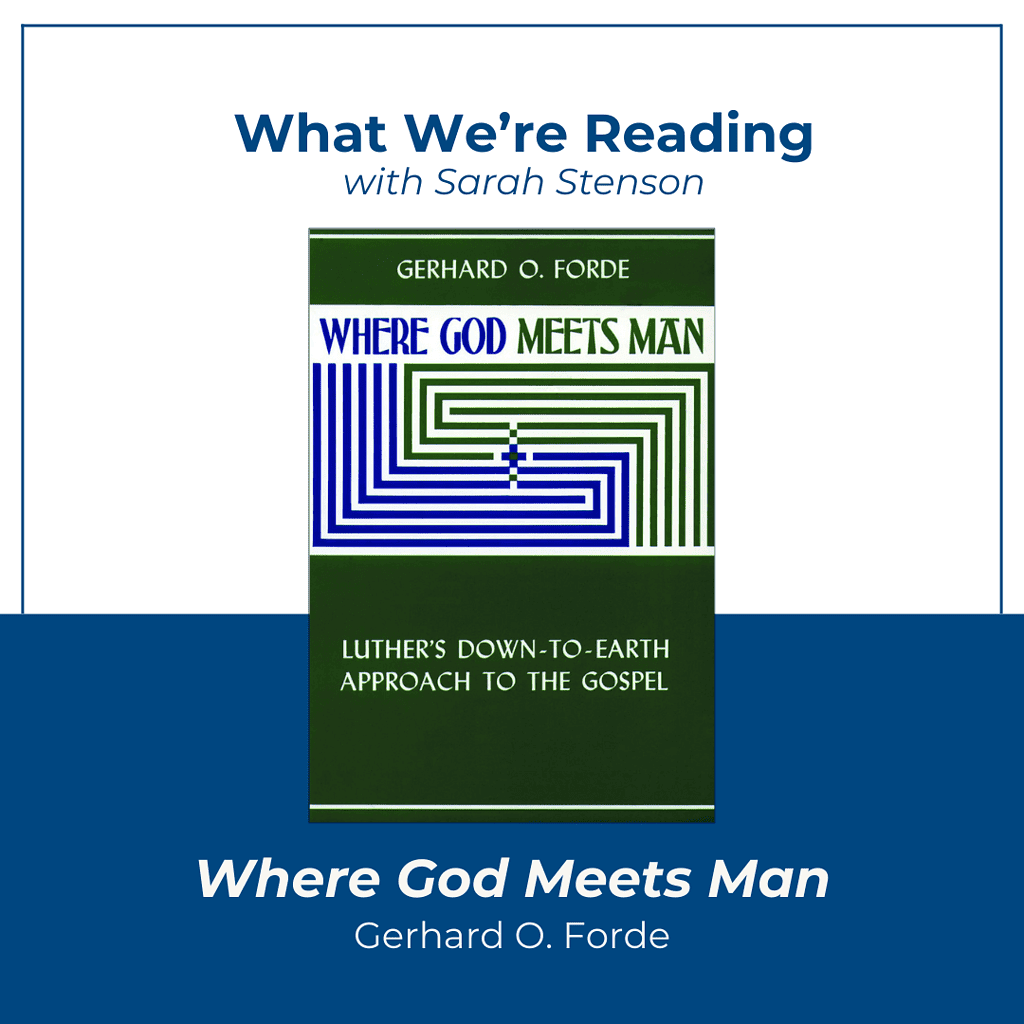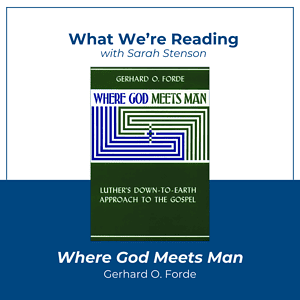Reading excellent theology is naturally a key element of the educational experience here at Luther House.
We sat down with Sarah Stenson to discuss one of our foundational texts, Where God Meets Man by Gerhard O. Forde.
Sarah shares some of her takeaways and explains why this text stands as a cornerstone in Lutheran education, offering clarity and depth to students at any level.
She also recounts the powerful influence Forde had on her own theological understanding, solidifying her confession through his honest perspective rooted solely in Scripture.
Check out the Q&A with Sarah below, and let us know if you’re interested in more of these types of conversations with our professors.
Can you share a favorite takeaway from Where God Meets Man?
It’s right there in the title of the book — Forde is genius in the way he makes clear how we are freed to be down to earth as the creatures God created us to be. There’s no freedom in thinking we have to somehow get better or closer to God. Instead, we receive the tremendous freedom of the clear proclamation that “You are forgiven, and now you’re free to serve your neighbor, love your neighbor.”
Why is Where God Meets Man a critical text for students?
Having taught this book for over 16 years, I’ve been able to watch it impact other students the way it impacted me. All three of us (myself, Chris Croghan and Lars Olson) have said independently that it stands out as one of the most profound theological books we encountered in our education. There are certainly other important books that our students read, but it’s consistently Where God Meets Man that makes the biggest impact. Forde writes in such a seemingly simple manner, that no matter the amount of theological education students are coming in with, it holds depth that becomes more apparent as one delves deeper into theology.
What makes Forde’s writing so impactful?
Again, I think the reason so many people have been grabbed by his writing is his ability to articulate deep theological concepts in a way everyone can understand. One of the reasons I have so appreciated his writing is because he wrote in a way that was true to this strong proclamation of the Law and Gospel, but he did it in a way that was actually very kind, while remaining very firm. He did not equivocate or yield at all on our confession, but he also did not take pejorative shots at people for effect.
He was certainly capable of fairly and rightly criticizing other scholars with whom he didn’t agree, but he did it in a way that was respectful and, honestly, gentlemanly. One of the things I appreciate most about him is his writing, but at the core of that is his confession, which is right down the line with Luther’s understanding of Scripture and the Law/Gospel distinction.
How did Where God Meets Man affect you when you first read it?
It was the very first book I read when I took the Reformation class 17 years ago. Probably within a month of the class starting, I was on Amazon looking for more of Forde’s writings. Then I found On Being a Theologian of the Cross, and those two books absolutely cemented my confession because they were so honest and true to Scripture.
I didn’t grow up Lutheran — I had sort of a “Protestant mutt” background — so I had experienced a number of different theologians and done a lot of different Bible studies before eventually becoming Lutheran, and that was when I finally read Forde.
He’s someone who’s an honest broker of Scripture. There are so many parts of Scripture that we don’t like, and we often see these overlays and philosophies being applied to it. But Luther, and then Forde, says you can’t apply philosophy to Scripture.
These other theologies would have logical gaps and holes, and as a lawyer, I would always say the “yes, but…” Luther and Forde didn’t do that. They just said, “This is actually what Scripture says.”
Intrigued? Grab a copy of Where God Meets Man on Amazon, or request information about our next iteration of the Reformation class by emailing info@lhos.org.
Did you enjoy this Q&A? Let us know in the comments if you’d like more of this type of content from our professors!


